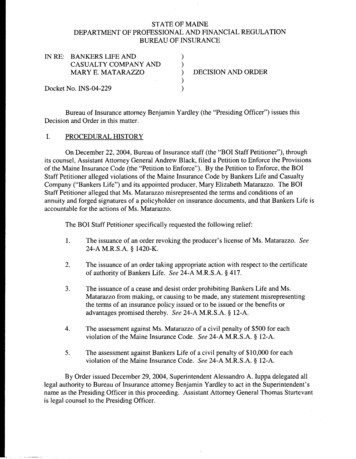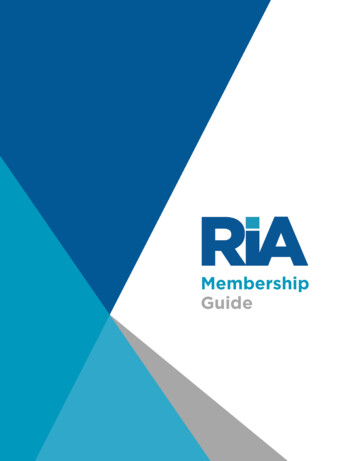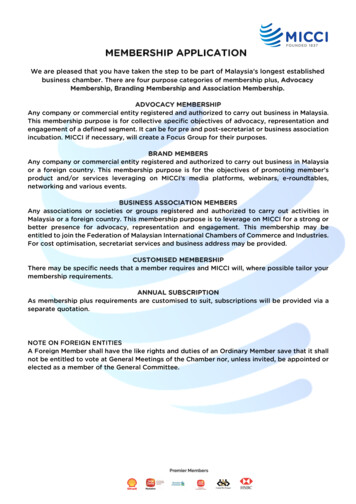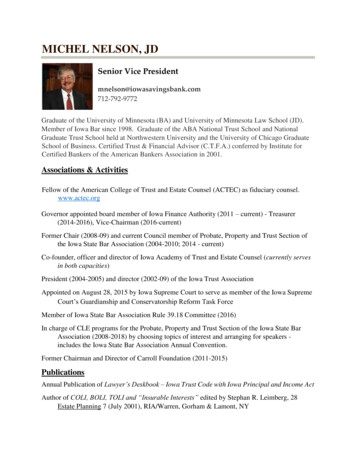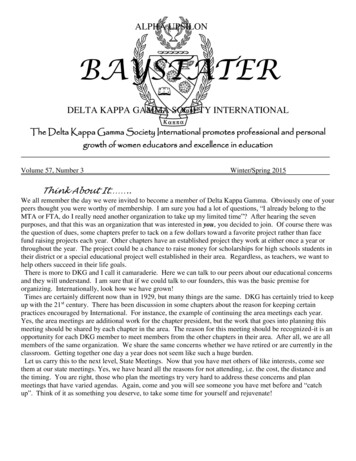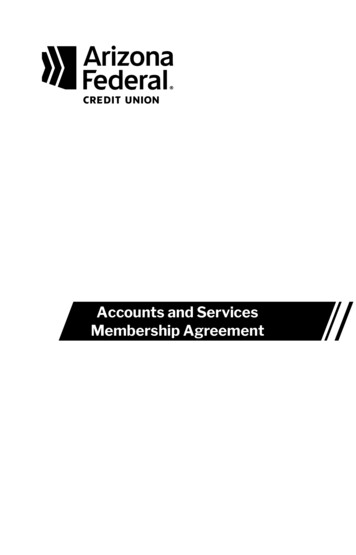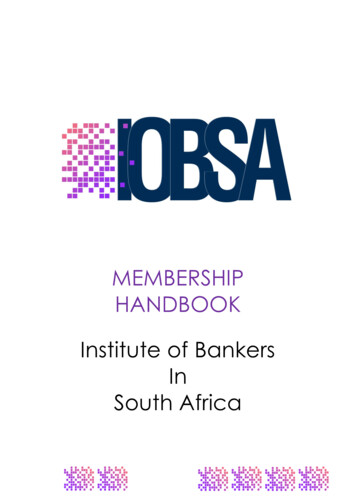
Transcription
MEMBERSHIPHANDBOOKInstitute of BankersInSouth Africa
PAGE OF CONTENTContents1. Introduction and Background . 11.1 Background . 11.2 Vision . 21.3 Our Purpose . 21.4 Mission. 21.5 Values . 21.5 Professional Designations . 22. Professional Designation Standard . 42.1 Designations . 42.1.1 Title of Professional Designation . 42.1.2 Designatory Letters . 42.1.3 Requirements for awarding of Professional Designation. 52.1.4 Alignment to the National Qualifications Framework (NQF) . 52.1.5 Maintenance of Professional Designation . 52.2 Fellow of Institute of Bankers in South Africa (FIBSA) . 52.2.1 Title of Professional Designation . 52.2.2 Designatory Letters . 52.2.3 Requirements for awarding of Professional Designation. 62.2.4 Alignment to the National Qualifications Framework (NQF) . 62.2.5 Maintenance of Professional Designation . 73. Application. 74. Registration. 75. Certification . 86. Maintenance of The Professional Designation . 86.1 Membership of the IOB . 86.2 Code of Ethics . 96.2.2 Disciplinary Code Under the Code of Ethics . 96.3 Continuing Professional Development . 12
ADDENDUMSADDENDUM A:IOB Equivalency Matrix22ADDENDUM B:IOB Code of Ethics25ADDENDUM C:Chartered Institute of Bankers in Scotland: Code of ProfessionalConduct26ADDENDUM D:Record of CPD Hours27
1. Introduction and BackgroundThe purpose of this handbook is to set out the processes, policies and documentationunderpinning the awarding of the professional designations offered by the Institute ofBankers. Not only professional designations but also the Code of Professional Conductof all IOBSA members.The IOB was recognized as a professional body by the South African QualificationsAuthority (SAQA) on 15 March 20131.1.1 BackgroundThe Institute of Bankers has a respectable history as the second oldest Institute ofBanking in the world and was established in 1904.The constitution states (1999: 3):Its main objective has been the promotion of efficiency through education andcontinuing professional development [sic] in the banking industry in general and of itsmembers in particular. It sought to do this by the dissemination of knowledge on thetheory and practice of banking and by conducting examinations and othereducational activities.In today’s rapidly changing technological, economic and social climate,competence is the key. Our courses are constantly updated to ensure that ourmembers are kept abreast of current trends, new technology, new legislation andother facets relevant to the changing face of banking locally and globally.The role of the IOBSA has changed over the years. Initially it was accredited as atraining provider by the BankSETA to deliver banking specific qualifications. This statusexpired in 2011 and has not been renewed. However the IOBSA still plays a critical rolein the delivery of industry specific exams and has been appointed as an AssessmentQuality Partner (AQP) by the Quality Council for Trades and Occupations (QCTO) forthe Bank Worker Learnership (Letsema Learnership programme (post matric) offeredby the Bank SETA through Milpark Business School (Generic Management Learnership)and Culhane Consulting (Credit and Risk Learnership)).The IOB in South Africa is a member-based professional body that aims to service theprofessional needs of bankers within the banking industry through the offering ofprofessional designations, the monitoring of a code of professional conduct and thedelivery of carefully designed and monitored CPD programmes.The IOB enjoys support from the big five banks. This is in the form of their representationon the Board, funding towards IOB activities and involvement of employees in the IOBdesignations, CPD activities and proposed special interest groups.1SAQA letter dated 15 March 20131IOB Handbook
1.2 VisionTo be an Industry capacity builder, owner and authority of knowledge, an integratorof certified financial service professionals and a mobiliser of the Financial ServicesIndustry1.3 Our PurposeTo capacitate the Financial Services Industry with people who make a difference1.4 MissionTo be the preferred professional body and Centre of Excellence providing services tothe banking and finance profession:ooooooPromoting education and trainingPartnering with international bodies to create value locallyContinuous professional developmentResearch and consultancy in banking and financeMembership and networking forumsCreation of the professional banker designations, endorsed by banks1.5 ValuesThe values underpinning the Institute’s vision and mission remain:ooooooCollaboration and partnershipsCustomer-centric and excellenceProfessionalism and teamworkInnovation and flexibilityRelevanceCommitment to transformation1.5 Professional DesignationsThe professional recognition framework offered by the IOB is presented in the figure below.2IOB Handbook
The recognition of the IOB by SAQA as the professional body included the recognitionof six professional designations currently offered by the IOB, they are:oooooThe Certified Associate of the Institute of Bankers (CAIB)The Fellow of the Institute of Bankers in South Africa (FIBSA)Licentiate in Banking (SA) (LIBSA)Associate of the Institute of Bankers (AIB(SA))Professional Banker SA (PB (SA))These designations include an experiential component as part of the IOB requirementsfor awarding the designation.The process of gaining a professional designation can be explained in four distinctsteps, namely:ooooApplication – this is when an interested party has read through the requirementsfor gaining the professional designation and believes that s/he qualifies. S/hewill then apply to be recognized against the professional designation standard.Registration – the IOB process for awarding the professional designation is aregistration process. Once an applicant’s application has been checked forcompliance against the professional designation standard, then compliantapplicants are registered and awarded the designation. Part of the registrationprocess will include an evaluation – for the Chartered Banker, for example, thiswill include an examination.Certification – successful applicants are awarded the professional designationand a certificate is issued by the IOB.Maintenance – the designees are required to maintain their designationthrough a process of continuing professional development.Apply to IOBSA forawarding ofProfessionalDesignationREGISTRATIONComply withrequirements forawarding of ProfessionalDesignationMeet ProfessionalDesignationStandardApplication verified byEducation CommitteeCandidate awardedprofessionaldesignationCERTIFICATIONRead ProfessionalDesignationStandardCertificate Issued toCandidateRequirements formaintenance ofdesignation acceptedDesignee detailsentered onto nationalregisterMAINTENANCEAPPLICATIONThe process is detailed in the figure below:Designee participatein CPD programmeCPD programmeCPDCode of EthicsIOBMembership3IOB Handbook
The following sections of this handbook present the different components making upthe steps required to gain and maintain the two professional designations that arecurrently offered by the IOB.2. Professional Designation StandardThe standard against which the designations are awarded are documented in theprofessional designation standard. This standard comprises the following elements:oooooTitle of the Professional DesignationDesignatory LettersRequirements for awarding of Professional DesignationAlignment to the National Qualifications Framework (NQF)Maintenance of Professional DesignationThe professional designation standards for the following designation are presented inthe following section.Registered Professional Designations:Designation ID473474Designation TitleCertified Associate of the Institute of Bankers in SouthAfrica (CAIB (SA))Fellow of the Institute of Bankers in South Africa (FIBSA)534535PB (SA) – Professional Banker South AfricaAIB (SA) - Associate of the Institute of Bankers536LIB (SA) – Licentiate in Banking South AfricaThe CB Designation has also been registered (more details will be available on request) Chartered Banker. No SAQA Designated ID available yet.See example below which is applicable to all the above designations.2.1 DesignationsThese are the professional designation standard against which the designation isawarded to individuals that qualify against the criteria as set out below.2.1.1 Title of Professional DesignationAs per the SAQA insert above.2.1.2 Designatory LettersAs per SAQA above4IOB Handbook
2.1.3 Requirements for awarding of Professional DesignationThe candidate must have acquired a Degree/Diploma. The qualifications that areconsidered equivalent to this qualification are listed in the IOB Equivalency Matrix2 (seeAddendum A).2.1.4 Alignment to the National Qualifications Framework(NQF)The professional designation is not currently linked to an OFO profile (OrganizingFramework for Occupations) on the National Occupations Pathway Framework(NOPF). However, it is the intention of the IOB to ensure that this designation is alignedto the occupational award when it is developed. It is also the intention of the IOB toregain its status as Development Quality Partner (DQP) and Assessment Quality Partner(AQP) to the Quality Council Quality for Trades and Occupations (QCTO).2.1.5 Maintenance of Professional DesignationThe professional designation status needs to be maintained by the designee. Thisincludes three different criteria, namely:oooIOB membership – this must be kept up to date annually;IOB Code of Ethics3 – the designee must subscribe to the code and submit thisundertaking in writing (as per the attached form) annually to the IOB; and,IOB CPD programme – the designee must participate in the CPD programmeas stipulated by the IOB.Failure to comply with these requirements will result in the professional designationbeing revoked by the IOB.2.2 Fellow of Institute of Bankers in South Africa (FIBSA)This is the professional designation standard against which the FIBSA is awarded toindividuals that qualify against the criteria as set out below.2.2.1 Title of Professional DesignationFellow of the Institute of Bankers in South Africa2.2.2 Designatory LettersFIBSA2Addendum A – IOB Equivalency Matrix3Addendum B – IOB Code of Ethics5IOB Handbook
2.2.3 Requirements for awarding of Professional DesignationFellowship of the Institute is awarded very selectively and reflects a professional andsenior status. The professional designation can be awarded to IOB members of nonmembers.Awarding FIBSA: CAIB (SA) MEMBERSThe following conditions need to be met in order for members to be nominated forFellowship:ooooThree-year membership of the Institute which must be current at the time ofnominationHolder of the CAIB (SA) designationSeven years in a managerial capacityThe nomination must be sponsored by two Associates or two Fellows of theInstitute (not retired)Awarding FIBSA: NON-CAIB (SA)The following conditions need to be met in order for non-members to be nominatedfor Fellowship:ooo15 years membership of the InstituteHolder of another professional qualificationSeven years in a managerial capacityNominations are submitted to the Board for their consideration. Fellows are expectedto play an active role in supporting the Institute.2.2.4 Alignment to the National Qualifications Framework(NQF)The professional designation is not currently linked to an OFO profile (OrganizingFramework for Occupations) on the National Occupations Pathway Framework(NOPF). However, it is the intention of the IOB to ensure that this designation is alignedto the occupational award when it is developed. It is also the intention of the IOB toregain its status as Development Quality Partner (DQP) and Assessment Quality Partner(AQP) to the Quality Council Quality for Trades and Occupations (QCTO).6IOB Handbook
2.2.5 Maintenance of Professional DesignationThe professional designation status needs to be maintained by the designee. Thisincludes three different criteria, namely:oooIOB membership – this must be kept up to date annually;IOB Code of Ethics4 – the designee must subscribe to the code and submit thisundertaking in writing (as per the attached form) annually to the IOB; and,IOB CPD programme – the designee must participate in the CPD programmeas stipulated by the IOB.Failure to comply with these requirements will result in the professional designationbeing revoked by the IOB.3. ApplicationOnce an individual has read through the professional designation standard andunderstood the requirements for obtaining and maintaining the professionaldesignation, then s/he is able to apply to the IOB. The applicant completes theattached application form 5 and ensures that the supporting documentation andrelevant payment accompany the submission.The submission is made to:IOBSA18 Fricker RoadMaitland BuildingGround FloorIllovoTel: 011 268 0669Email address: Info@iob.co .zaThe applicant must ensure that proof of receipt or acknowledgement of receipt of theapplication is received from the IOB.4. RegistrationThe application is processed and, if it meets the standard as set out in the professionaldesignation standard, then the candidate is awarded the professional designation.The recommendation for certification is submitted to the IOB Board for sign off. Oncethis is done, then the applicant can be certificated.4Addendum B – IOB Code of Ethics5Addendum F – Application Form7IOB Handbook
5. CertificationOnce the approval is granted by the IOB Board, then the certificate is issued for theprofessional designation. The candidate is approached and asked to indicate theirsubscription to the IOB Code of Ethics. The candidate is also issued with the IOBHandbook in order to ensure that s/he knows the requirements for maintaining theirprofessional designation.It is important to note that:ooooThe certificate remains the property of the IOB.The certificate is issued every 5 years and has an expiry date on it.A new certificate will only be issued to designees that comply with the IOBrequirements for maintenance of the professional designation.Each certificate bears a unique number that is used to trace it should it needto be withdrawn.A certification ceremony is arranged by the IOB at least once a year.6. Maintenance of The Professional DesignationA designee needs to maintain their status through:oooMaintenance of annual membership of the IOB(SA);Compliance with the CPD requirements – as prescribed by the IOB(SA); and,Subscription to the Code of Professional Conduct of the IOB(SA).Failure to comply with these requirements could result in the designation beingwithdrawn from a candidate.6.1 Membership of the IOBAnnual membership fees are communicated to all IOB members. Invoices are issuedand members are expected to pay their fees every year.6.1.1 Special Member SectionBenefits of MembershipooooMembership of the Institute is aimed at helping individuals working within thebanking and financial services sector to achieve, sustain and demonstratethe highest standards of customer focused and ethical professionalism.No matter what your career stage, membership gives you the chance todemonstrate your commitment to following best practice as a FinancialServices Professional.As a member, you'll benefit from the Institute's status, and professionalstanding, and be able to meet the requirements of the South Africa’s financialservices regulators.Members have access to a range of powerful networking opportunities withbanking peers and other professionals, helping develop and build businessand career opportunities.8IOB Handbook
ooThe Code of Professional Practice to which members conform helps you carryout your duties and responsibilities to the highest professional standardRaise your professional profile through the volunteering opportunities we canoffer. These range from speaking at events, writing content, committee work,and to inform thought leadership.For details of membership please contact Juan Greyling, Membership andAssessment Consultant. juan@iob.co.za6.2 Code of EthicsAll designees are required to subscribe to the IOB Code of Ethics. This is currently beingreviewed and will be aligned to the Chartered Institute of Bankers in Scotland (CIOBS)Code of Professional Conduct6.All designees are required to submit their undertaking in writing by signing the Code ofEthics Signatory Sheet7. This is emailed back to Martie at martie@iob.co.za6.2.2 Disciplinary Code Under the Code of EthicsEvery member of the Institute of Bankers is required to subscribe to the Code ofProfessional Conduct. Under this code, the professional found guilty of an offence;could be subject to:oooooA warning being issued by the IOBSA;A fine being raised to the IOBSA member;The designation being withdrawn;Prevention from being able to gain membership of the IOBSA again; orOther sanctions.This brief document outlines the process that will be used to discipline an IOBSAmember should they be found guilty of misconduct under the Code of ProfessionalConduct.It is important to note that the code not only protects the public from fraudulentmembers, but it also aims to protect the integrity, honesty and fairness of members.6Addendum D – CIOBS Code of Professional Conduct7Addendum E – Code of Ethics Signatory Sheet9IOB Handbook
The Disciplinary Procedure is presented in the figure below: Step 1 – Complaint submitted to Institute of Bankers in SouthAfrica:oA complaint is received in writing by the CEO or Chairperson of the Institute. Step 2 – Preliminary Investigation:ooThe CEO or chairperson conducts a preliminary investigation to determinewhether the complaint has validity. Complaint not substantiated: Should the outcome of this preliminaryinvestigation yield no substantive claim, then no further action is takenby the IOBSA. Complaint substantiated: However, should the outcome of thepreliminary investigation yield evidence of misconduct, then thecomplaint is submitted to the IOBSA Board of Directors for furtherinvestigation.The accused and complainant are informed of the outcome of thispreliminary investigation. Step 3 – Appointment of Disciplinary CommitteeoThe IOBSA Board of Directors is then required to set up a disciplinarycommittee. The committee should be made up of at least 3 (three)members. One member needs to be a member of the IOBSA Board ofDirectors. The Disciplinary Committee will be chaired by a member of thelegal profession.10IOB Handbook
Step 4 – In-depth InvestigationoThe complaint then undergoes an in-depth investigation by the disciplinarycommittee.oAll relevant parties are included in the investigation and kept up to date withthe proceedings. Where necessary, the disciplinary committee will call uponindividuals to testify or to submit documentation supporting the case. Step 5 – Disciplinary HearingoOnce the in-depth investigation is complete, a disciplinary hearing isscheduled and all relevant parties are notified and, where necessary,requested to attend the hearing.oThe case is heard and the complainant as well as the defendant is able totestify and present the relevant evidence.oThe Disciplinary Committee formulates their findings and submits a reportincluding a recommendation, to the IOBSA Board of Directors. Step 6 – Outcome of the Disciplinary Hearing andInvestigationoThe IOBSA Board of Directors meets to discuss the findings of the disciplinaryhearing and investigation. The recommendation is considered and the finaloutcome of the disciplinary process is decided.oThe outcome is communicated to the complainant and defendant.oThe final outcome could result in one of the following actions being taken bythe IOBSA Board of Directors: A warning is issued by the IOBSA Board of Directors; or A fine is raised; or The professional designation is forfeited by the defendant; or The designee is prevented from being able to gain membership of theIOBSA again; or, Other sanctions appropriate to the misdemeanor. Step 7 – Execution of DecisionoThe final decision is communicated to the relevant parties and executed.11IOB Handbook
6.3 Continuing Professional DevelopmentContinuing Professional Development (CPD) is the maintenance, improvement andbroadening of knowledge and skill and the development of the personal qualitiesnecessary for the execution of professional and associated duties throughout abanker’s working lifetime.Professional Recognition FrameworkThe professional designations are currently offered by the IOB,namely:ooooLicentiate in Banking South AfricaCertified Associate of the Institute of Bankers in South Africa (CAIB (SA));Associate of the Institute of Bankers in South Africa (AIB (SA))Professional Banker of the Institute of Bankers in South Africa (PB (SA))Once the professional designation is attained by a practitioner or professional, s/heneeds to maintain the status by ensuring compliance with the following requirements:oooMaintenance of annual membership of the IOB(SA);Compliance with the CPD requirements – as prescribed by the IOB(SA); and,Subscription to the Code of Professional Conduct of the IOB(SA).12IOB Handbook
CPD – What Is Required?An IOB member must complete a minimum number of 30 CPD hours every year whichis verifiable by the IOBSA. For all new members the CPD credits will be required to beobtained during that initial year. This will be communicated to the member.Time qualifying for formal CPD may not be more than:30 HOURS OF CPD every yearFAIS and ProfessionalCategory and Class ofBusinessEthics and Governance22 hours verifiable3 hours NonVerifiable5 hoursFormal CPD includes formally organised specifically related to banking such as:ooooIOB banking specific courses,Professional meetings,Formal in-house training andOverseas conferences focused on the banking sectorInformal CPD includes any other activity that the designate considers to be of value inmeeting the definition of CPD as above.This may include:oomanagement training. andlife skills training and development.13IOB Handbook
Types of CPD ActivitiesThe IOB(SA) does not prescribe the type of activities that a practitioner or professionalshould participate in order to complete their CPD programme. However, below is a listof different types of activities that could be included as formal or informal CPDactivities:Formal CPD Activitieso Participation in seminars,presentations and workshops(with or without assessment)o Participation in conventions orconferenceso Completion of courseso Online programmes offered byapproved institutionso Presenting, teaching orlecturing in the fieldo Professional examso Participation in IOBSA structureso Authorship of books, articlesand online publicationsInformal CPD Activitieso Professional readingo Participation in non-approved oraccreditedonlineactivitiesincluding podcasts, videos andonline magazinesIt is important to note that CPD points can only be awarded toactivities that are related to the field of Banking.Important to Note:1. Compliance with CPD requirements is the responsibility of the individual.2. Designates are required to keep their own records in order to support theirapplication for a CPD compliance certificate.3. Designees are required to submit a record of their CPD hours annually – by the15 January for the previous year. IOB staff (under the membership supportmanager) will review the record and all designates will receive a reconciliationof hours by the 15 February.4. Every three years the designee will receive a letter stating whether he/she hasmet the CPD requirements of the previous three years.14IOB Handbook
ADDENDUMS15IOB Handbook
Addendum A: IOB Equivalency MatrixQualification Title (2010)Certificate: BankingSAQAID11541FSCA QualificationApprovalListed for Category I (BN31514)Alternate Qualification TitleCertificate in Banking: Financial ServicesFinancial Services Certificate: BankingCertificate in BankingCertificateNational Certificate: BankingServices Advice48533Listed for Cat 1 and Cat IV(BN 31514)Certificate in Banking Services AdviceDiploma: Treasury:international Banking20334Listed for Cat IV (BN 31514)Financial Service Diploma: Treasury & InternationalBankingDiploma in Treasury & International BankingLicentiate Diploma (Various Diploma)Diploma: CreditDiploma: Trust EstateAdministration2033120335These qualifications do notmeet the Fit and Properrequirements for anyproduct categoryFinancial Services Diploma: CreditCredit DiplomaBanking Licentiate DiplomaFinancial Services Diploma: Estate & Trust AdministrationDiploma in Estate & Trust AdministrationValuers Diploma16IOB Handbook
Qualification Title (2010)Diploma: MarketingSAQAIDFSCA QualificationApproval20332Needs to gain FSB approvalAlternate Qualification TitleFinancial Services Diploma: MarketingMarketing DiplomaValuers DiplomaDiploma in Financial Planning76970Needs to gain FSB approvalFinancial Services Diploma: Financial PlanningDiploma in Estate & Financial PlanningValuers DiplomaAdvanced Diploma inFinancial Planning76964Needs to gain FSB approvalFinancial Services Diploma: Financial PlanningAdvanced Diploma in CreditLicentiate Diploma IIBankers Diploma IIAdvanced Diploma in Credit76966Needs to gain FSB approvalFinancial Services Diploma: CreditLicentiate Diploma IIAdvanced Diploma in CreditAdvanced Diploma inMarketing76969Needs to gain FSB approvalFinancial Services Diploma: MarketingLicentiate Diploma IIAdvanced Diploma in Marketing17IOB Handbook
Qualification Title (2010)Advanced Diploma in Treasuryand International BankingSAQAIDFSCA QualificationApproval76963Needs to gain FSB approvalAlternate Qualification TitleFinancial Services Diploma: Treasury and InternationalBankingLicentiate Diploma IIAdvanced Diploma in Treasury and InternationalBankingAdvanced Diploma in Estateand Trust76968Needs to gain FSB approvalFinancial Services Diploma: Estate and TrustLicentiate Diploma IIAdvanced Diploma in Estate and TrustAdvanced Diploma in Property76965Needs to gain FSB approvalFinancial Services Diploma: PropertyLicentiate Diploma IIAdvanced Diploma in PropertyAdvanced Diploma in CentralBanking76967Needs to gain FSB approvalFinancial Services Diploma: Central BankingLicentiate Diploma IIAdvanced Diploma in Central Banking18IOB Handbook
Addendum B: IOB Code of EthicsCODE OF ETHICSAs professionals in the Banking sector, IOB requires its members tocommit to raising standards in the industry and to undertake all activitiesby observing the highest levels of professional conduct in light of thecore values of:ooooCustomer ingly, members should conduct their business affairs inaccordance with this Code of Ethics by observing the followingprinciples:o Acting in the best interests of their clients and not allowing theirown interests or those of their employer to override the interestsof their clientso Acting with due skill, care and diligence in conducting their worko Preserving client confidentiality at all timeso Respecting the intellectual property rights of otherso Protecting and promoting the integrity of the banking industryo Avoiding and/or disclosing any real or perceived conflicts ofinteresto Respecting the dignity of otherso Never knowingly misleading or deceiving otherso Developing and maintaining an understanding of the ethicalissues in their professional rolesAll members of the Institute of Bankers are required toadhere to the IOB Code of Ethics19IOB Handbook
Addendum C: Chartered Institute of Bankers inScotland: Code of Professional ConductAs a member of CIOBS I will:1. At all times act in a professional and ethical way and uphold thehighest standards of honesty, trust, fairness, integrity anddiligence.2. Consider the risks and implications of my actions, beaccountable for them, and for the impact my actions may haveon others.3. Comply with all current regulatory and legal requirement
by the Bank SETA through Milpark Business School (Generic Management Learnership) and Culhane Consulting (Credit and Risk Learnership)). The IOB in South Africa is a member-based professional body that aims to service the professional needs of bankers within the banking industry through the offering of professional designations, the monitoring .
